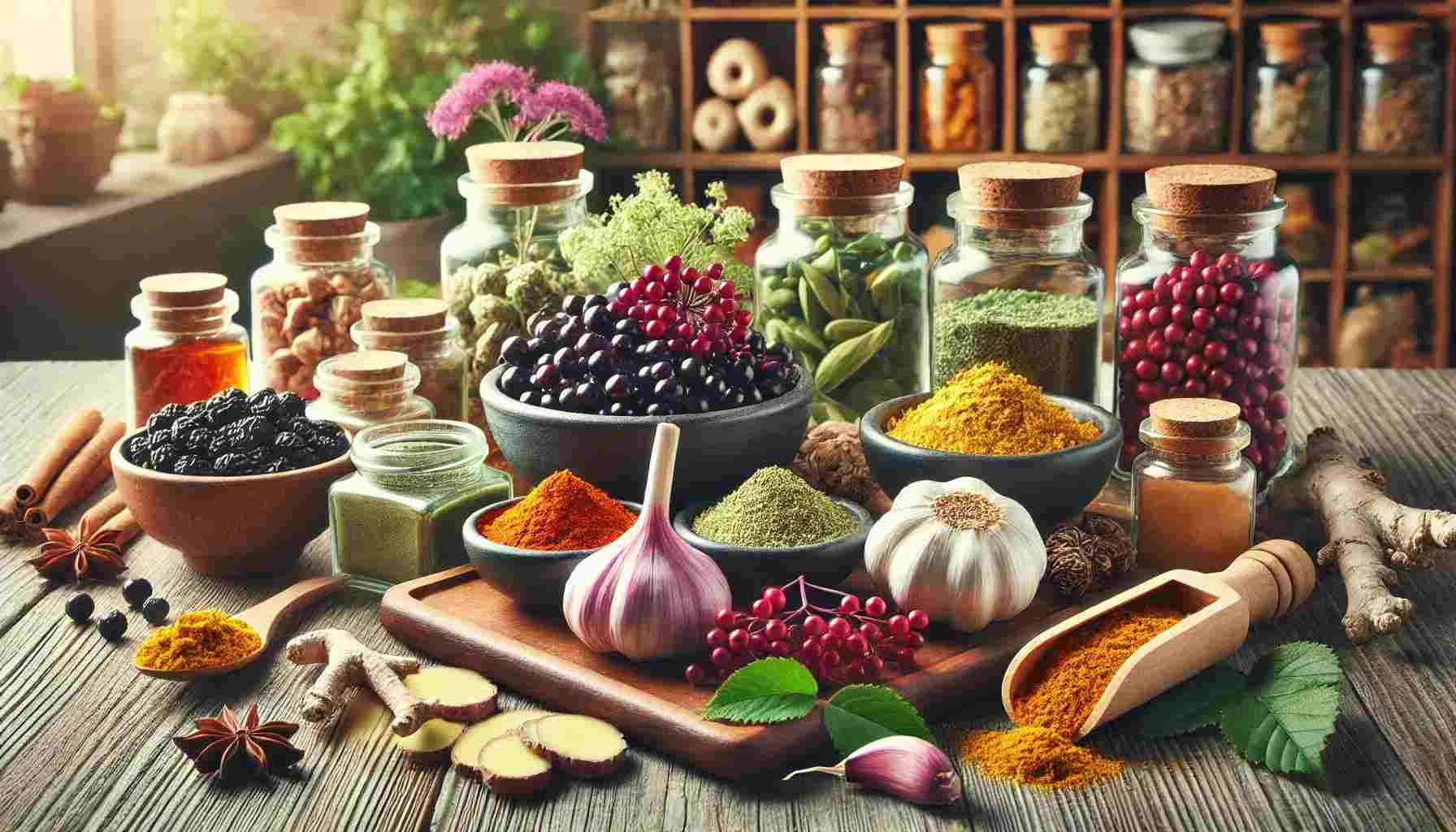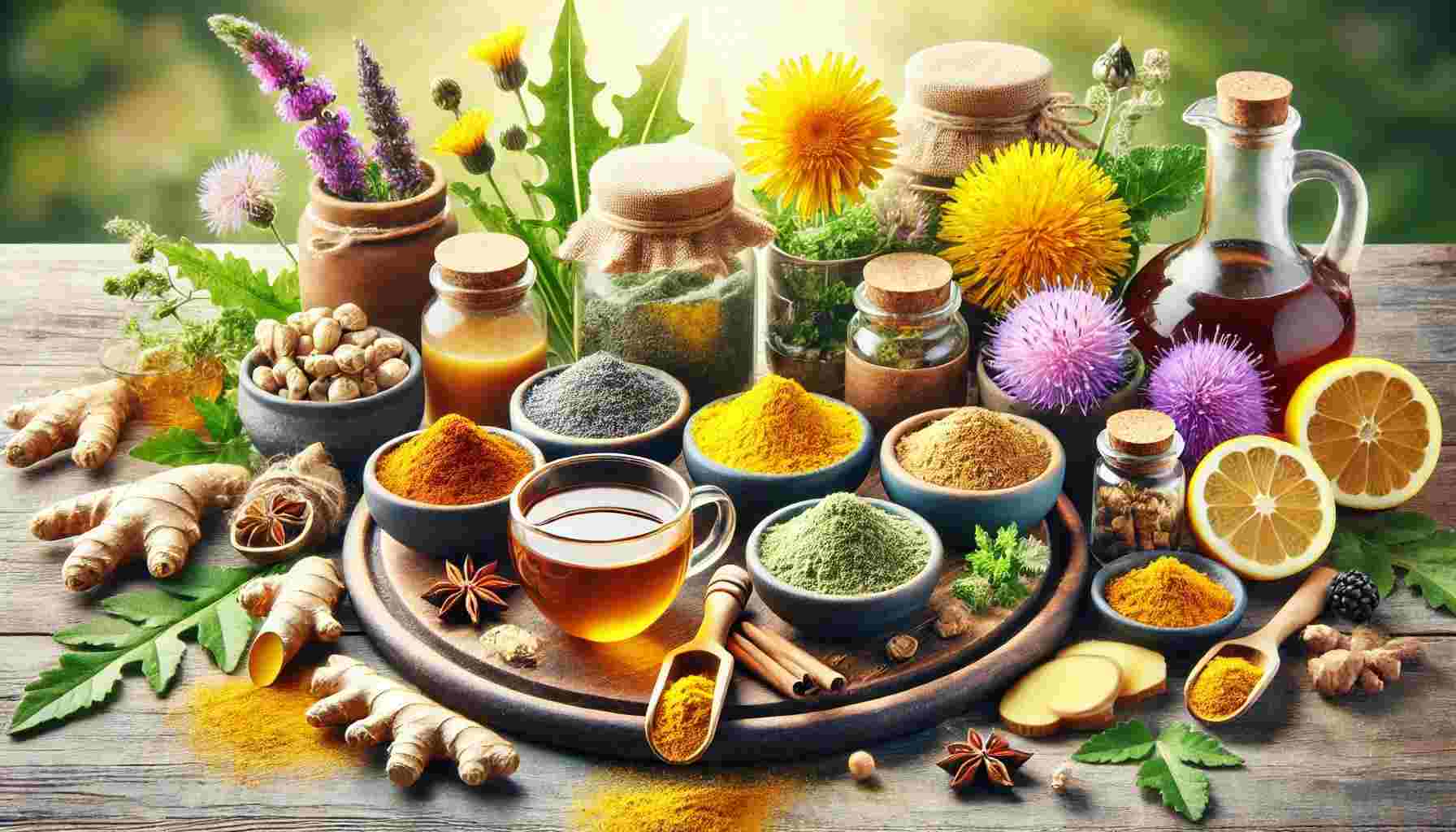Herbal Immune Supplements: Boost Your Immunity Naturally

Introduction to Herbal Immune Supplements
In recent years, people have become increasingly interested in natural remedies to support their immune health. Among the most popular natural remedies are herbal immune supplements, which provide the immune system with a powerful boost from plant-based ingredients. With the rise of global health concerns, individuals are turning to these supplements to enhance their immune defenses and maintain overall well-being.
Herbal immune supplements are dietary supplements made from various herbs that have been traditionally used for centuries in different cultures to promote health and wellness. These supplements harness the natural properties of herbs known for their immune-boosting abilities. By tapping into the wisdom of herbal medicine, individuals can support their body’s natural defenses without relying solely on synthetic or chemical-based products.
Maintaining a robust immune system is essential for a healthy life. The immune system is the body’s natural defense mechanism, protecting us from harmful pathogens such as viruses, bacteria, and toxins. Herbal immune supplements work by strengthening this defense system, helping the body ward off illness and stay resilient against infections. Whether it’s cold and flu season or simply a stressful time, herbal immune supplements offer a natural way to support immune health effectively.
How Herbal Immune Supplements Work
Herbal immune supplements are crafted from a variety of plants, each with unique properties that contribute to immune support. These supplements typically include herbs that are rich in antioxidants, vitamins, and minerals, all of which play a vital role in maintaining a healthy immune response.
Natural Ingredients in Herbal Immune Supplements
Herbs like echinacea, elderberry, and astragalus are common ingredients found in many herbal immune supplements. These plants contain bioactive compounds, such as flavonoids, polyphenols, and essential oils, which are known for their immune-boosting properties. For example, elderberry is rich in antioxidants, which help neutralize harmful free radicals in the body, while echinacea is known for its ability to stimulate white blood cell production.
Mechanisms of Action
Herbal immune supplements work through various mechanisms to support immune health:
- Antioxidant Protection: Many herbs in these supplements are high in antioxidants, which protect cells from oxidative damage and reduce inflammation, both of which are critical for a healthy immune system.
- Anti-inflammatory Effects: Chronic inflammation can weaken immune response. Herbs like turmeric contain curcumin, a compound known for its potent anti-inflammatory effects, helping to keep the immune system balanced.
- Supporting White Blood Cell Production: White blood cells are the front line of defense in the immune system. Herbs such as echinacea and astragalus stimulate the production of these cells, enhancing the body’s ability to fend off infections.
In comparison to synthetic immune boosters, herbal immune supplements offer a more holistic approach. They work synergistically with the body, promoting overall health rather than merely targeting specific symptoms. This is why many people prefer herbal immune supplements for long-term immune support.
Top Herbal Immune Supplements
Numerous herbs have gained popularity due to their immune-supporting properties. Here are some of the most widely recognized herbs found in herbal immune supplements:
Echinacea
Echinacea is a well-known herb often used to prevent and treat colds and respiratory infections. It contains active compounds that boost the immune system by increasing white blood cell activity. Echinacea supplements are typically recommended during cold and flu season to enhance immune defenses.
Elderberry
Elderberry has long been used for its antiviral properties. It is particularly effective against influenza viruses and is often used to shorten the duration of flu symptoms. Elderberry is rich in vitamins A and C, as well as flavonoids, making it a powerful antioxidant that supports immune health.
Astragalus
Astragalus root is a traditional Chinese herb that has been used for centuries to strengthen the immune system. It helps stimulate white blood cells and has adaptogenic properties, which means it helps the body resist stress and disease. Astragalus is often used in combination with other herbs to boost overall vitality and resilience.
Garlic
Garlic is a potent immune-supporting herb due to its antibacterial and antiviral properties. It contains allicin, a compound that helps the body fight off infections. Garlic is not only effective as an immune booster but also promotes heart health and overall wellness.
Ginger
Ginger is widely recognized for its anti-inflammatory and antioxidant properties. It helps the immune system by reducing inflammation, which can weaken immunity over time. Ginger is also beneficial for digestive health, which is closely linked to immune function.
Turmeric
Turmeric, a golden-yellow spice, contains curcumin, a compound with strong anti-inflammatory and antioxidant properties. Curcumin supports the immune system by reducing inflammation and supporting the body’s natural healing processes. It is often combined with black pepper to enhance absorption.
Each of these herbs plays a unique role in supporting immune health, making them valuable ingredients in herbal immune supplements. By combining these herbs, many supplements offer a synergistic effect, providing comprehensive immune support.
Benefits of Herbal Immune Supplements
Choosing herbal immune supplements offers a host of benefits that go beyond simply boosting immune health. Here are some of the key advantages:
Natural and Fewer Side Effects
Herbal immune supplements are generally gentler on the body compared to synthetic alternatives. They harness natural ingredients that the body can easily recognize and process, resulting in fewer side effects. This makes them suitable for long-term use, as they are less likely to cause harm to the body’s systems.
Antioxidant Properties
Many herbs in immune supplements are rich in antioxidants. These compounds help combat oxidative stress, which can weaken immune function. Antioxidants also protect cells from damage, promoting overall health and resilience against illness.
Anti-inflammatory Effects
Chronic inflammation can have a negative impact on immune health. Herbs like turmeric and ginger offer powerful anti-inflammatory effects, helping to reduce chronic inflammation and support a balanced immune response.
Support for the Respiratory System
Herbs such as elderberry and echinacea are particularly beneficial for respiratory health. They help to prevent and relieve symptoms of colds, flu, and other respiratory infections, providing targeted support to the respiratory system.
General Well-being
In addition to supporting immune health, herbal immune supplements contribute to overall well-being. Many herbs have adaptogenic properties, which means they help the body adapt to stress and promote a sense of balance and vitality. This holistic approach makes herbal immune supplements a great choice for those looking to support their health naturally.
How to Choose the Right Herbal Immune Supplement
With so many options available, choosing the right herbal immune supplement can feel overwhelming. Here are some key factors to consider:
Understanding Product Labels
When selecting a herbal immune supplement, it’s essential to read the product label carefully. Look for information about the herbs included, the dosage, and any additional ingredients. Ensure that the product lists both the common and botanical names of the herbs, as well as their concentration.
Quality and Purity of Ingredients
The quality of the ingredients is crucial. Opt for supplements that use high-quality, pure ingredients. Some products may contain fillers or artificial additives, which can reduce the supplement’s effectiveness. Choose products that are certified organic whenever possible, as they are less likely to contain pesticides or other harmful chemicals.
Organic vs. Non-Organic Options
Organic supplements are often preferred because they are made from herbs grown without synthetic pesticides or fertilizers. While they may be more expensive, the investment can be worth it for the added purity and environmental benefits.
Dosage and Safety Considerations
Pay attention to the recommended dosage for each herb within the supplement. Herbal immune supplements can vary significantly in potency, so it’s important to follow the dosage instructions provided by the manufacturer. Overdosing on herbal supplements can lead to side effects or reduced effectiveness, so it’s crucial to adhere to these guidelines.
Reputable Brands and Certifications
To ensure you’re getting a high-quality product, purchase from reputable brands that adhere to strict manufacturing standards. Look for certifications such as Good Manufacturing Practices (GMP) or third-party testing, which indicate that the product has been tested for quality and purity. Certifications from organizations like NSF International or USP (United States Pharmacopeia) are also good indicators of product quality.
By taking these factors into account, you can select a herbal immune supplement that meets your needs and supports your immune health effectively. Investing time in research ensures that you’re making a well-informed decision that aligns with your health goals.
Potential Side Effects and Safety Considerations
While herbal immune supplements are generally safe for most people, it’s essential to be aware of potential side effects and safety considerations. Here are some important points to consider:
Common Side Effects of Herbal Immune Supplements
Although herbal supplements are natural, they can still cause side effects, especially if taken in large doses. Common side effects may include digestive issues, such as nausea or upset stomach, especially when herbs like garlic or ginger are taken on an empty stomach. Some individuals may also experience allergic reactions, particularly if they have sensitivities to specific plants.
Interaction with Medications
Herbal supplements can interact with medications, which can either enhance or reduce the effectiveness of certain drugs. For example, garlic can interact with blood-thinning medications, potentially increasing the risk of bleeding. Similarly, echinacea may interact with immunosuppressants. It’s essential to discuss any herbal immune supplements with your healthcare provider, especially if you are taking prescription medications.
Consultation with a Healthcare Provider
Before starting any new supplement regimen, it’s advisable to consult with a healthcare provider. This is particularly important for individuals with chronic health conditions, pregnant or breastfeeding women, and those who are currently taking medications. A healthcare professional can provide guidance on the appropriate dosage and ensure that the supplement is safe for you.
When to Avoid Herbal Immune Supplements
Some individuals should avoid herbal immune supplements altogether. For instance, people with autoimmune disorders may find that certain immune-boosting herbs exacerbate their condition. Additionally, children and the elderly may be more sensitive to the effects of herbal supplements and should use them only under medical supervision.
Taking these precautions can help you make the most of herbal immune supplements while minimizing the risk of side effects. Always prioritize safety and consult with a healthcare provider when in doubt.
Incorporating Herbal Immune Supplements into Your Lifestyle
Once you’ve chosen the right herbal immune supplement, integrating it into your daily routine can enhance its effectiveness. Here are some tips on how to incorporate these supplements into your lifestyle:
Tips for Regular Use
To get the most benefit from herbal immune supplements, it’s best to take them consistently. Follow the dosage instructions on the product label and consider setting a reminder to help establish a routine. Some supplements are more effective when taken with food, while others may be taken on an empty stomach, so check the specific recommendations for your supplement.
Pairing with a Balanced Diet and Healthy Habits
Herbal immune supplements work best when combined with a healthy lifestyle. Eating a balanced diet rich in fruits, vegetables, whole grains, and lean proteins provides your body with essential nutrients that support immune function. Additionally, regular exercise, adequate sleep, and stress management all play a crucial role in maintaining a strong immune system.
Seasonal Usage and Targeted Support
Many people find it helpful to use herbal immune supplements seasonally, particularly during the colder months when colds and flu are more prevalent. Some herbs, like elderberry and echinacea, are particularly beneficial during these times. Alternatively, you might choose to use herbal supplements during periods of high stress or travel, when immune support is especially needed.
By integrating these supplements into your daily routine and maintaining a healthy lifestyle, you can optimize your immune health and build resilience over time.
Conclusion
In today’s health-conscious world, herbal immune supplements offer a natural and effective way to support immune health. With a wide range of herbs, such as echinacea, elderberry, and astragalus, these supplements provide the immune system with vital nutrients and compounds that enhance its functionality. Whether you’re looking for preventive support during flu season or simply seeking a natural way to bolster your body’s defenses, herbal immune supplements can be an excellent choice.
However, it’s essential to approach herbal supplements with care. Understanding potential side effects, consulting with healthcare professionals, and choosing high-quality products are all crucial steps in making the most of these natural remedies.
Incorporating herbal immune supplements into a balanced lifestyle, alongside a nutritious diet and healthy habits, can help you build a resilient immune system. As with any health-related decision, it’s wise to seek guidance from healthcare professionals to ensure that you’re making choices that align with your specific needs and health goals.
By embracing the natural power of herbs, you can support your immune health in a holistic and sustainable way. Consider adding herbal immune supplements to your wellness routine and experience the benefits they have to offer.
FAQs on Herbal Immune Supplements
1. What are herbal immune supplements?
Herbal immune supplements are natural products made from various herbs known for their immune-boosting properties. These supplements help strengthen the body’s immune system and improve its ability to fight off infections.
2. How do herbal immune supplements work?
Herbal immune supplements contain herbs rich in antioxidants, anti-inflammatory compounds, and other beneficial nutrients that support immune health. These herbs may help enhance white blood cell production, reduce inflammation, and protect cells from oxidative stress, collectively promoting a stronger immune response.
3. Are herbal immune supplements safe to take daily?
Most herbal immune supplements are safe for daily use when taken according to the recommended dosage. However, it’s important to consult with a healthcare provider, especially if you have underlying health conditions or are taking other medications, as some herbs can interact with certain drugs.
4. Can herbal immune supplements prevent illnesses like the flu or colds?
While herbal immune supplements can strengthen the immune system and reduce the severity or duration of symptoms, they are not guaranteed to prevent illnesses. They work best as a supportive measure rather than as a cure or sole preventive method.
5. Who should avoid taking herbal immune supplements?
People with autoimmune disorders, pregnant or breastfeeding women, and those with allergies to specific herbs should consult a healthcare provider before taking herbal immune supplements. Additionally, children and elderly individuals should use these supplements with caution.
6. What are some common herbs found in immune supplements?
Some commonly used herbs include echinacea, elderberry, astragalus, garlic, ginger, and turmeric. Each of these herbs has specific properties that support immune health in different ways.
7. Are there any side effects of herbal immune supplements?
Although they are generally safe, some people may experience mild side effects, such as digestive discomfort, allergic reactions, or interactions with medications. It’s best to start with a lower dose to see how your body reacts and consult with a healthcare provider if you experience any adverse effects.
8. How do I choose the right herbal immune supplement?
Look for high-quality products from reputable brands that provide clear labeling of ingredients and dosage. Opt for organic or certified supplements when possible, and read reviews to ensure the product has a good track record.
9. Can I take herbal immune supplements with other vitamins and supplements?
Yes, many herbal immune supplements can be taken alongside other vitamins and supplements. However, it’s advisable to consult with a healthcare provider to avoid potential interactions and ensure you’re not exceeding recommended dosages.
10. How long does it take to see the effects of herbal immune supplements?
The time it takes to notice effects can vary depending on the supplement and individual health factors. Some people may feel benefits within a few days, while others might need to take the supplement consistently for a few weeks to experience noticeable improvements.
These FAQs provide a helpful overview of herbal immune supplements and address common concerns. If you have specific questions, it’s always best to consult with a healthcare professional.
Read Previous Article: Buy Junk Cars Near Me: A Comprehensive Guide to Turning Your Clunker into Cash in the USA





